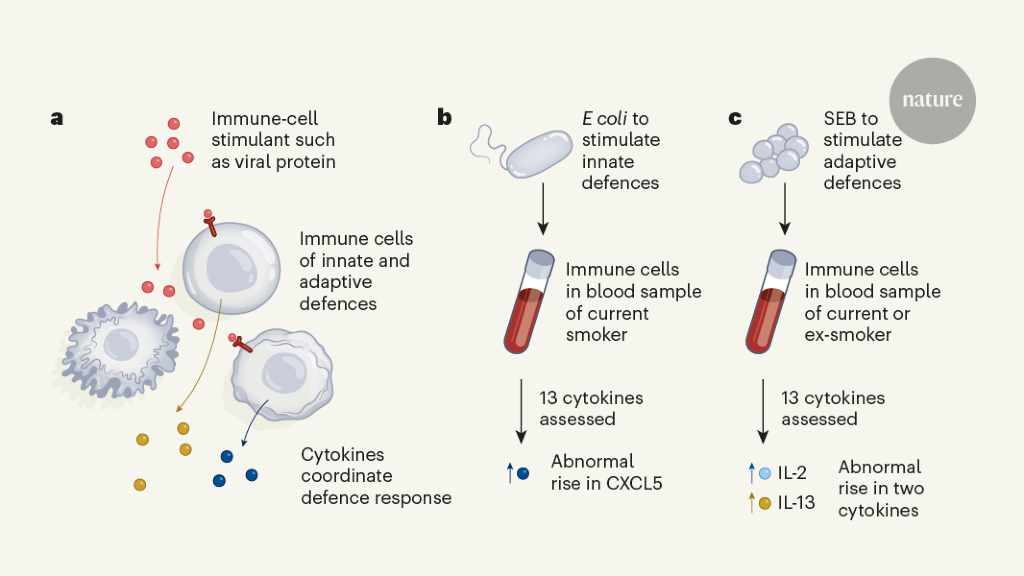Conceptos Básicos
The author explores how smoking affects the immune system's response variability and highlights the findings from a study on healthy individuals.
Resumen
When our bodies face pathogens like bacteria and viruses, immune cells release cytokines to coordinate defense mechanisms. These molecules signal other immune cells to respond appropriately. The secretion of cytokines varies among individuals due to environmental and genetic factors. Saint-André et al. examined data from the Milieu Intérieur project, focusing on immune system variability in 1,000 healthy individuals.
Personalizar resumen
Reescribir con IA
Generar citas
Traducir fuente
A otro idioma
Generar mapa mental
del contenido fuente
Ver fuente
www.nature.com
Smoking’s lasting effect on the immune system
Estadísticas
The Milieu Intérieur project studied 1,000 healthy individuals.
Citas
Ideas clave extraídas de
by Yang Luo a las www.nature.com 02-14-2024
https://www.nature.com/articles/d41586-024-00232-3
Consultas más profundas
How does smoking impact immune responses differently in various populations?
Smoking has been shown to have a significant impact on the immune system, affecting the production and function of cytokines that play a crucial role in coordinating the body's defense mechanisms against pathogens. Research indicates that smoking can lead to an imbalance in cytokine levels, resulting in dysregulated immune responses. Interestingly, these effects can vary among different populations due to genetic factors and environmental influences. For example, certain individuals may be more susceptible to the immunosuppressive effects of smoking based on their genetic predisposition or exposure to other environmental stressors. Understanding these population-specific differences is essential for developing targeted interventions and personalized treatment strategies.
What are the potential implications of understanding immune system variability for personalized medicine?
By gaining insights into the variability of the immune system among individuals, especially through initiatives like the Milieu Intérieur project, we can pave the way for personalized medicine approaches tailored to each person's unique immunological profile. This knowledge allows healthcare providers to predict how an individual might respond to specific treatments or vaccines based on their immune characteristics. Personalized medicine holds great promise for optimizing therapeutic outcomes while minimizing adverse reactions by customizing interventions according to an individual's immune response patterns. Ultimately, this approach could revolutionize healthcare delivery by moving towards precision medicine that considers each patient's distinct biological makeup.
How can studying immune response variability contribute to addressing global health challenges?
Studying immune response variability offers valuable insights into how different populations react to infectious diseases and other health threats worldwide. By examining variations in cytokine secretion and overall immunity across diverse groups, researchers can identify vulnerable populations at higher risk of infections or poor treatment outcomes. This information is crucial for designing targeted public health interventions aimed at improving disease prevention strategies and enhancing vaccination programs globally. Additionally, understanding immune system diversity can aid in developing more effective therapies against emerging pathogens or drug-resistant strains by tailoring treatments based on specific immunological profiles prevalent within affected communities. Overall, leveraging knowledge about immune response variability has immense potential for mitigating global health challenges and promoting better healthcare equity across populations.
0
